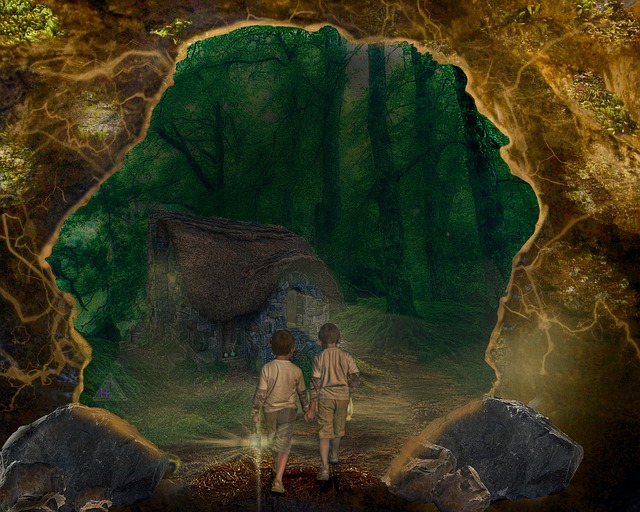Cuentos y rondas tradicionales de Arjona como estrategia pedagógica Arjona tierra de amores, de historias y cantadores
Barra lateral del artículo

Cómo citar
Altmetrics
Detalles del artículo

Esta obra está bajo una licencia internacional Creative Commons Atribución-NoComercial 4.0.
Contenido principal del artículo
Resumen
El artículo deviene de la investigación “Los cuentos y las rondas tradicionales como estrategias para el fortalecimiento de la competencia del lenguaje en los factores de comprensión textual y literatura, de los niños de 7 a 12 años de la IE Benjamín Herrera, sede Ángela Dorado Arjona, Bolívar”. Nace de las inquietudes durante el VIII semestre de Licenciatura en Pedagogía Infantil de la Corporación Universitaria Iberoamericana. La iniciativa busca implementar en los niños de los dos ciclos 1 y 2 la adquisición de las competencias lectoras, esenciales en la educación, porque estas mejoran la comprensión de textos y el agrado por adquirir nuevos conocimientos, razón por la cual se estructuró una estrategia pedagógica a través de cuentos y rondas tradicionales, para fortalecer el lenguaje y la comprensión textual de los niños. La metodología empleanda para el desarrollo del proyecto es cualitativa, y se utilizó para analizar los resultados obtenidos con la observación participante. Al finalizar la estrategia, los estudiantes logran identificar el propósito comunicativo y la idea global de un texto, exponen y defienden sus ideas en función de la situación comunicativa, estructuran historias claras teniendo en cuenta personajes, tiempo y espacio. La estrategia pedagógica propuesta en la investigación desarrolló las competencias de lenguaje a través de cuentos y rondas tradicionales en los desempeños de comprensión textual y literatura establecidos por el Ministerio de Educación Nacional.
Referencias
Alvarado, L. (2005). Escuela de Recreación COMCAJA - Caldas- Colombia [publicación del blog]. Recuperado de http://efvidadeporte.blogspot.com/2012/06/juegos-la-ronda.html.
Babilonia, N. (12 de abril de 2015). El baúl de mis abuelos
[perfil de Facebook]. Recuperado de www.facebook.com/691196017627822/photos/poetas-del-ayerjulio-gil-beltránsimancasnace-en-arjona-bolívar-el-1-de-septiemb/830961296984626/
Babilonia, N. (10 de septiembre de 2018). El baúl de mis abuelos [perfil de Facebook]. Recuperado de www.facebook.com/permalink.php?story_fbid=1959643320783079&id=691196017627822&__tn__=K-R
Barón, B. (2018). ¿Quiénes son y dónde están? Investigación biográficonarrativa en el contexto colombiano. Teachers and Trainers, 9(1), 149-163.
Barón, B., García Z., Gutiérrez B., Mendieta C., Herrera C., Riveros
D., et al. (2017). Caracterización de las prácticas docentes universitarias: desafíos para la cualificación docente en la Facultad de Educación de UNIMINUTO. Bogotá: Corporación
Universitaria Minuto de Dios - UNIMINUTO.
Bianchi, M. (2017). Narrar, recitar y cantar literatura folklórica: un aporte a la cultura de la paz. Praxis Pedagógica, 17(21), 97-105. DOI: https://doi.org/10.26620/uniminuto.praxis.17.
2017.97-105
Bausela, E. (2013). La docencia a través de la investigación-acción. Revista Iberoamericana de Educación, 35(1), 1-9. DOI: https://doi.org/https://doi.org/10.35362/rie3512871
Blanco, V. (2012). Teorías de los Juegos: Piaget, Vigotsky, Groos [publicación del blog]. Recuperado de https://actividadesludicas2012.wordpress.com/2012/11/12/teorias-de-los-juegos-piaget-vigotsky-kroos/
Daniels, H. (2016). Learning in Cultures of Social Interaction. Revista de Investigación Educativa, 34(2), 315-328. DOI: http://dx.doi.org/10.6018/rie.34.2.252801
Daniels, H. (2010). The mutual shaping of human action and institutional settings: a study of the transformation of children’s services and professional work. The British Journal of Sociology
of Education, 31(4), 377-393. DOI: http://doi:10.1080/01425692.2010.484916
G., G. (2012). Mancalata [archivo de audio grabado por A. S. Pájaro]. Arjona, Colombia.
Guarnizo, O. (2014). El cuento como estategia pedagógica para la formación de hábitos de lectura desde la infancia. Tolima: Universidad del Tolima.
Harlan, C. (2018). Qué es una décima. Aboutespañol. Recuperado de www.aboutespanol.com/decima-2206986
López, G. (1996). La narración de cuentos y la adquisición de la lengua inglesa en la Enseñanza Primaria. Revista Interuniversitaria de formación del profesorado, (25), 159-166.
Martínez, M. (2009). Ciencia y arte en la metodología cualitativa. México: Trillas.
Pérez, A. (1997). Recreación: Fundamentos teoricos-metodológico. México: Instituto Politécnico Nacional.
Peréz, P. (2014). Las rondas infantiles. Aula Virtual Profesora Paula Peréz Groos [publicación del blog]. Recuperado de http://paulaperezuniojeda.blogspot.com/2014/04/las-rondasinfantiles.html
Pérez, P. y Sánchez, D. (2013). El cuento como recurso educativo. 3c Empresa: investigación y pensamiento crítico, 2(4), 1-29.
Ramírez, N. (2012). La importancia de la tradición oral: el grupo Coyaima-Colombia. Revista Cientifica Guillermo de Ockham, 10(2), 129-143. DOI: https://doi.org/10.21500/22563202.2365




